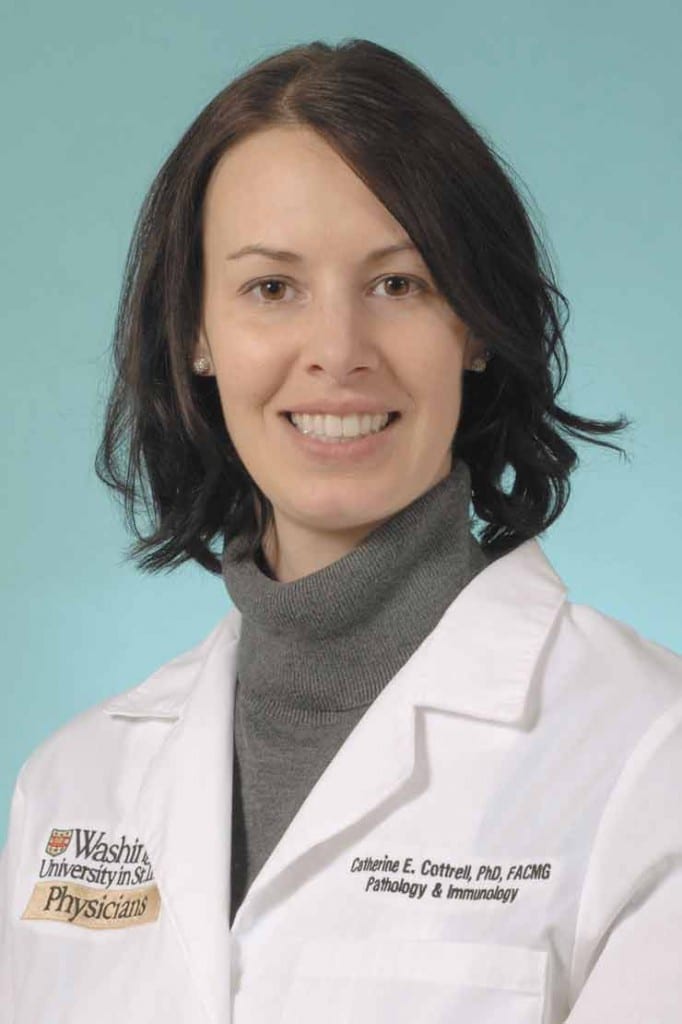Forewarned is forearmed. This old proverb, dating back to the 16th century, means the same now as it did then: advance warning provides an advantage. If you know about something beforehand, you can prepare for it, fix it or maybe even prevent it.
Now a simple genetic test, covered by most insurance plans, reveals if you’re at risk for certain types of heart disorders. The CardioGene Set, developed at Washington University and offered through the school’s Genomics and Pathology Services (GPS), analyzes genes to find genetic alterations linked to heart rhythm or heart muscle disorders, such as arrhythmia or cardiomyopathy.
“The CardioGene Set, a collaboration between the pathology/immunology and genetics department and cardiologists at Washington University, is simple and cost-effective—and it could save your life,” says GPS medical director Catherine Cottrell, Ph.D., assistant professor of pathology/immunology and genetics. “If you have a family history or other indications of these disorders, your physician can send us a blood sample for gene sequencing. In three to four weeks, we’ll send him or her a thorough report describing variants in your DNA that may contribute to disease and/or affect your response to treatment. Results can help refine diagnoses and allow cardiologists to tailor an individualized treatment and management plan for each patient.” It may also help family members of affected patients decide if they, too, want to be tested to see if they’re at risk for heart issues, she adds.
A well-known condition that might be prevented via CardioGene Set testing is hypertrophic cardiomyopathy, a thickening of the heart muscle that can lead to sudden cardiac arrest and other problems. “HCM is often the cause when young athletes suffer a sudden fatal cardiac arrest, even if they’ve never before shown any symptoms of heart problems,” Cottrell says. “With early genetic diagnosis of this condition, physicians could possibly save lives by advising their patients to avoid physical overexertion.”
CardioGene Set builds on another innovative GPS test that analyzes multiple genes in tumors, enabling doctors to provide targeted cancer therapies, Cottrell explains. Prior to these tests, most genes could be examined individually for mutations. But many diseases are characterized by abnormalities in sets of genes, not single genes. “Now, the cancer and cardiac testing panels can simultaneously examine the several dozen genes most likely to influence treatment of a patient’s condition,” she says. “Sequencing multiple genes at once substantially increases our chances of detecting critical mutations or variants. CardioGene Set, for example, includes genes linked to eight cardiac disorders and can report on as many as 69 genes, saving money and time.” Only physicians can order the tests, she adds.
What’s next? “By the end of the year, we hope to expand our test portfolio to include renal disease and a broader range of blood-based cancers,” Cottrell says. “GPS is a huge step forward in personalized, targeted, more effective treatments for patients everywhere. You can always depend on Washington University to lead the way in research and patient care.”
By Tony Di Martino
Photo by Washington University Physicians
Pictured: Catherine Cottrell, Ph.D.
[For more information on the CardioGene Set or Washington University Genomics and Pathology Services, call 314.747.7337 or visit gps.wustl.edu.]
